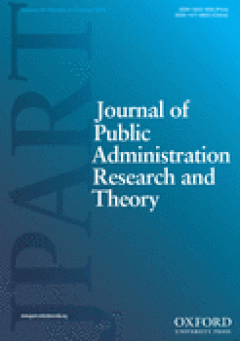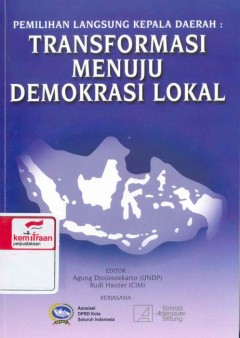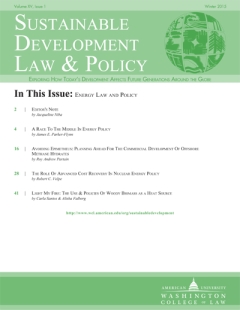Filter by

This Could Be the Start of Something Big: Linking Early Managerial Choices wi…
The influence of early events in the history of a country, a social phenomenon, or an organization on later developments has received significant attention in many social science disciplines. Often dubbed “path dependence,” this influence occurs when early events influence later outcomes even when the original events do not reoccur. “Path dependence,” however, has received little theoretical or…
- Edition
- Volume 25, Number 1, January 2015 p.135-164
- ISBN/ISSN
- 10531858
- Collation
- -
- Series Title
- Journal of Public Administration Research and Theory
- Call Number
- -

Local Government Management and Performance: A Review of Evidence
Local governments play a critical role in delivering services to the public. Over recent decades scholars have begun to empirically examine the relationship between the management and performance of local governments, locating this in economic, contingency, and resource-based theoretical frameworks. In this study, we undertake a comprehensive assessment of what is currently known about the mana…
- Edition
- Volume 25, Number 1, January 2015 p. 101-134
- ISBN/ISSN
- 10531858
- Collation
- -
- Series Title
- Journal of Public Administration Research and Theory
- Call Number
- -

Administrative Burden: Learning, Psychological, and Compliance Costs in Citiz…
This article offers two theoretical contributions. First, we develop the concept of administrative burden as an important variable in understanding how citizens experience the state. Administrative burden is conceptualized as a function of learning, psychological, and compliance costs that citizens experience in their interactions with government. Second, we argue that administrative burden is …
- Edition
- Volume 25, Number 1, January 2015 p. 43-70
- ISBN/ISSN
- 10531858
- Collation
- -
- Series Title
- Journal of Public Administration Research and Theory
- Call Number
- -

Predicting Public Sector Accountability: From Agency Drift to Forum Drift
Principal-agent theory has been the dominant theory at the heart of public sector accountability research. The notion of the potentially drifting agent—such as independent public agencies, opaque transnational institutions, or recalcitrant street-level bureaucrats—has been the guiding paradigm in empirical accountability research. The aim of this article is first of all to signal the limits of …
- Edition
- Volume 25, Number 1, January 2015 p. 191-216
- ISBN/ISSN
- 10531858
- Collation
- -
- Series Title
- Journal of Public Administration Research and Theory
- Call Number
- -

Kapita selekta dan beban biaya sosial korupsi
Komisi Pemberantasan Korupsi (KPK), menyadari bahwa sebagai institusi yang diberi kewenangan memberantas tindak korupsi di negeri ini tak akan mampu berjalan sendiri. Terlebih ke depan, kita lebih mengedepankan upaya pencegahan di samping penindakan yang selama ini dilakukan. KPK butuh dukungan seluruh elemen bangsa untuk sama-sama mengetaskan bangsa ini dari cengkeraman tindakan busuk para kor…
- Edition
- -
- ISBN/ISSN
- -
- Collation
- xi, 108 p. ; ill. ; tab. ; 20 cm.
- Series Title
- Membangun generasi anti korupsi
- Call Number
- 364.132 3 TIM k

Pengaduan masyarakat terindikasi tipikor
Komisi Pemberantasan Korupsi (KPK), menyadari bahwa sebagai institusi yang diberi kewenangan memberantas tindak korupsi di negeri ini tak akan mampu berjalan sendiri. Terlebih ke depan, kita lebih mengedepankan upaya pencegahan di samping penindakan yang selama ini dilakukan. KPK butuh dukungan seluruh elemen bangsa untuk sama-sama mengetaskan bangsa ini dari cengkeraman tindakan busuk para kor…
- Edition
- -
- ISBN/ISSN
- -
- Collation
- ix, 53 p. ; ill. ; tab. ; 20 cm.
- Series Title
- Membangun generasi anti korupsi
- Call Number
- 364.132 3 TIM p

Pengantar gratifikasi
Komisi Pemberantasan Korupsi (KPK), menyadari bahwa sebagai institusi yang diberi kewenangan memberantas tindak korupsi di negeri ini tak akan mampu berjalan sendiri. Terlebih ke depan, kita lebih mengedepankan upaya pencegahan di samping penindakan yang selama ini dilakukan. KPK butuh dukungan seluruh elemen bangsa untuk sama-sama mengetaskan bangsa ini dari cengkeraman tindakan busuk para kor…
- Edition
- -
- ISBN/ISSN
- -
- Collation
- vii, 137 p. ; ill. ; tab. ; 20 cm.
- Series Title
- Membangun generasi anti korupsi
- Call Number
- 364.132 3 TIM p

Pengantar laporan harta kekayaan penyelenggara negara
Komisi Pemberantasan Korupsi (KPK), menyadari bahwa sebagai institusi yang diberi kewenangan memberantas tindak korupsi di negeri ini tak akan mampu berjalan sendiri. Terlebih ke depan, kita lebih mengedepankan upaya pencegahan di samping penindakan yang selama ini dilakukan. KPK butuh dukungan seluruh elemen bangsa untuk sama-sama mengetaskan bangsa ini dari cengkeraman tindakan busuk para kor…
- Edition
- -
- ISBN/ISSN
- -
- Collation
- ix, 98 p. ; ill. ; tab. ; 20 cm.
- Series Title
- Membangun generasi anti korupsi
- Call Number
- 364.132 3 TIM p

Pengantar kelembagaan anti korupsi
Komisi Pemberantasan Korupsi (KPK), menyadari bahwa sebagai institusi yang diberi kewenangan memberantas tindak korupsi di negeri ini tak akan mampu berjalan sendiri. Terlebih ke depan, kita lebih mengedepankan upaya pencegahan di samping penindakan yang selama ini dilakukan. KPK butuh dukungan seluruh elemen bangsa untuk sama-sama mengetaskan bangsa ini dari cengkeraman tindakan busuk para kor…
- Edition
- -
- ISBN/ISSN
- -
- Collation
- ix, 132 p. ; ill. ; tab. ; 20 cm.
- Series Title
- Membangun generasi anti korupsi
- Call Number
- 364.132 3 TIM p

Creating Business Plans
- Edition
- -
- ISBN/ISSN
- 9781625272225
- Collation
- viii, 141p.; 18 cm
- Series Title
- -
- Call Number
- 658.4 HAR c
- Edition
- -
- ISBN/ISSN
- 9781625272225
- Collation
- viii, 141p.; 18 cm
- Series Title
- -
- Call Number
- 658.4 HAR c

Social Psychology
- Edition
- -
- ISBN/ISSN
- 9780393913231
- Collation
- xxii, 621p.; 27 cm
- Series Title
- -
- Call Number
- 300 GIL s
- Edition
- -
- ISBN/ISSN
- 9780393913231
- Collation
- xxii, 621p.; 27 cm
- Series Title
- -
- Call Number
- 300 GIL s

HBR guide to persuative presentations
- Edition
- -
- ISBN/ISSN
- 978-1-4221-8710-4
- Collation
- xvii, 227p.; 23 cm
- Series Title
- -
- Call Number
- 658.4 HAR h
- Edition
- -
- ISBN/ISSN
- 978-1-4221-8710-4
- Collation
- xvii, 227p.; 23 cm
- Series Title
- -
- Call Number
- 658.4 HAR h

Lanskap otonomi daerah : analisa dan kritik
Sejak awal, hadirnya UU No. 32/2004 sudah terlihat betapa pihak yang paling diuntungkan adalah elit lokal dan nasional. Semangat UU ini lebih banyak dalam bidang distribusi kekuasaan dan pembagian keputusan ketimbang memberikan otonomi kearah kemandirian daerah. Ini tetap saja intinya menyangkut pemerintahan, serta bukan otonomi dalam artian yang lebih luas. Hany saja, apa yang disebut pemerint…
- Edition
- -
- ISBN/ISSN
- 979-98221-2-2
- Collation
- xiv, 198p.; 23 cm
- Series Title
- -
- Call Number
- 352, PIL, l

Pemilihan langsung kepala daerah: transformasi menuju demokrasi lokal
- Edition
- -
- ISBN/ISSN
- -
- Collation
- xiii, 139p.; 21 cm
- Series Title
- -
- Call Number
- 352, DJO, p
- Edition
- -
- ISBN/ISSN
- -
- Collation
- xiii, 139p.; 21 cm
- Series Title
- -
- Call Number
- 352, DJO, p

John P. Kotter on what leaders really do
Widely acknowledged as the world's foremost authority on leadership, John Kotter has devoted his remarkable career to studying organizations and those who run them, and his bestselling books and essays have guided and inspired leaders at all levels. Here, in this collection of his acclaimed Harvard Business Review articles, is an astute assessment of the real work of leaders, as only John Kotte…
- Edition
- -
- ISBN/ISSN
- 0875848974
- Collation
- 181p.; 22 cm
- Series Title
- -
- Call Number
- 658.4 KOT j

HBR guide to getting the right work done
- Edition
- -
- ISBN/ISSN
- 9781422187111
- Collation
- x, 184p.; 23 cm
- Series Title
- -
- Call Number
- 658.4 HAR h
- Edition
- -
- ISBN/ISSN
- 9781422187111
- Collation
- x, 184p.; 23 cm
- Series Title
- -
- Call Number
- 658.4 HAR h

Sustainable Development Law & Policy, Volume 12, Issue 3, Spring 2012
- Edition
- -
- ISBN/ISSN
- 15523721
- Collation
- -
- Series Title
- -
- Call Number
- -
- Edition
- -
- ISBN/ISSN
- 15523721
- Collation
- -
- Series Title
- -
- Call Number
- -

Sustainable Development Law & Policy, Volume 13, Issue 1, 2012-2013
- Edition
- -
- ISBN/ISSN
- 15523721
- Collation
- -
- Series Title
- -
- Call Number
- -
- Edition
- -
- ISBN/ISSN
- 15523721
- Collation
- -
- Series Title
- -
- Call Number
- -

HBR's 10 must reads on communication
- Edition
- 1st edition
- ISBN/ISSN
- 9781422189863
- Collation
- xv, 190p.; 21 cm
- Series Title
- -
- Call Number
- 658.4 HAR h
- Edition
- 1st edition
- ISBN/ISSN
- 9781422189863
- Collation
- xv, 190p.; 21 cm
- Series Title
- -
- Call Number
- 658.4 HAR h

Social Research: an international quarterly, Volume 79, Number 4, Winter 2012
- Edition
- -
- ISBN/ISSN
- 0037-783X
- Collation
- -
- Series Title
- -
- Call Number
- -
- Edition
- -
- ISBN/ISSN
- 0037-783X
- Collation
- -
- Series Title
- -
- Call Number
- -
 Computer Science, Information & General Works
Computer Science, Information & General Works  Philosophy & Psychology
Philosophy & Psychology  Religion
Religion  Social Sciences
Social Sciences  Language
Language  Pure Science
Pure Science  Applied Sciences
Applied Sciences  Art & Recreation
Art & Recreation  Literature
Literature  History & Geography
History & Geography